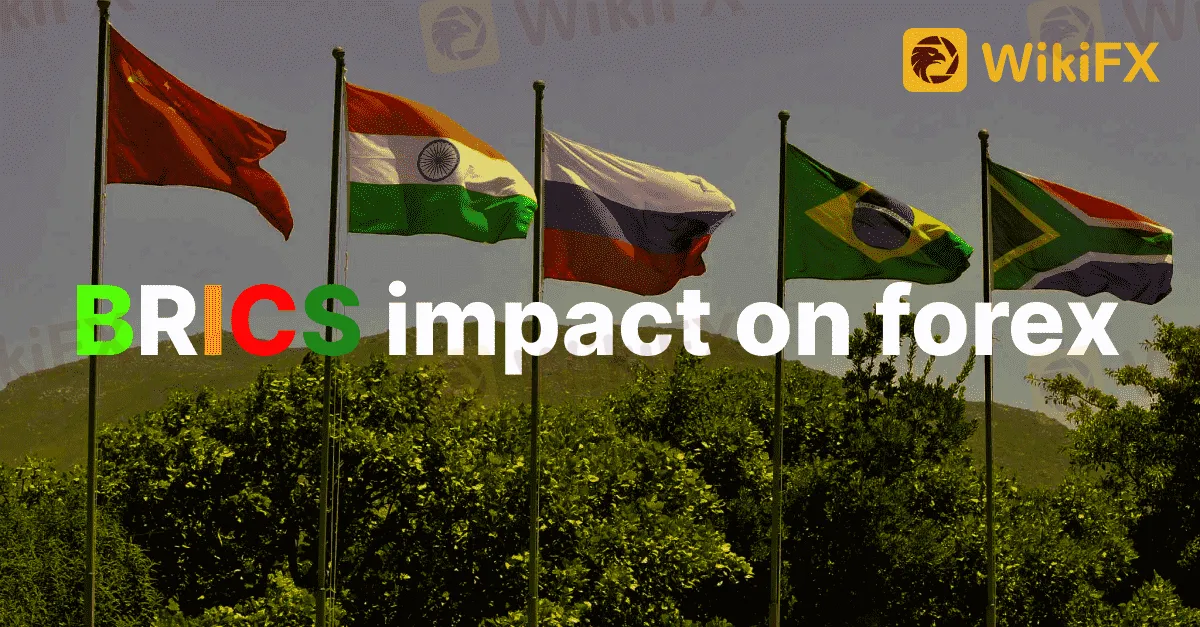简体中文
繁體中文
English
Pусский
日本語
ภาษาไทย
Tiếng Việt
Bahasa Indonesia
Español
हिन्दी
Filippiiniläinen
Français
Deutsch
Português
Türkçe
한국어
العربية
BRICS impact on forex
Abstract:BRICS, which stands for Brazil, Russia, India, China, and South Africa, is a group of emerging economies that have gained considerable economic and political influence in recent years. As these countries continue to grow and develop, their impact on the global economy, including the European forex markets, is becoming increasingly important.

BRICS, which stands for Brazil, Russia, India, China, and South Africa, is a group of emerging economies that have gained considerable economic and political influence in recent years. As these countries continue to grow and develop, their impact on the global economy, including the European forex markets, is becoming increasingly important.
The first way in which BRICS will impact the European forex markets is through trade. These five countries are all major exporters of goods and services, and their increasing economic power means that they will be increasingly important trading partners for Europe. As trade between these countries and Europe increases, this will lead to an increase in demand for their currencies, which will in turn have an impact on the forex markets.
Another way in which BRICS will impact the European forex markets is through investment. As these economies continue to grow and develop, they will become increasingly attractive to investors. This will lead to an increase in demand for their currencies, which will also have an impact on the forex markets. As investors shift their focus to these emerging markets, this may also have an impact on the value of the euro and other major currencies.
In addition to trade and investment, BRICS will also impact the European forex markets through political and economic factors. For example, these countries may work together to form new trade agreements, which could have an impact on the forex markets. They may also work together to push for reforms in international organizations such as the International Monetary Fund (IMF), which could also have an impact on the forex markets.
Overall, it is clear that BRICS will have a significant impact on the European forex markets in the coming years. As these countries continue to grow and develop, they will become increasingly important players in the global economy. This will lead to an increase in demand for their currencies, which will in turn have an impact on the forex markets.
If you are interested in staying up-to-date with the latest developments in the forex markets, including the impact of BRICS, then WikiFX is an excellent resource to turn to. WikiFX is a leading forex information platform that provides traders with up-to-date information on currency pairs, brokers, and trading strategies. With its comprehensive database of brokers and its user-friendly interface, WikiFX is a great tool for traders of all levels.
To find out more about WikiFX and to start using its powerful tools and resources, simply visit their website at www.wikifx.com. Whether you are a seasoned trader or just starting out, WikiFX can help you stay informed and make better trading decisions. So why wait? Sign up for WikiFX today and start taking advantage of all the benefits it has to offer!

Disclaimer:
The views in this article only represent the author's personal views, and do not constitute investment advice on this platform. This platform does not guarantee the accuracy, completeness and timeliness of the information in the article, and will not be liable for any loss caused by the use of or reliance on the information in the article.
Read more

OPEC's Profound Influence on the Oil Market
At present, oil prices remain relatively stable, but global economic recovery and shifting market demands continue to drive price fluctuations. Amid an uncertain global economic and geopolitical landscape, OPEC’s policies and actions remain key determinants of oil prices.

Think Before You Click: Malaysian Loses RM240,000 to Investment Scam
A manager from Sibu, Malaysia, lost RM240,000 to a fraudulent investment scheme.

What Euro Investors Can't Afford to Miss
For euro investors, geopolitical factors, inflation data, and the European Central Bank's policy direction will determine the market trends over the next few months.

How Big is the Impact of the USD-JPY Rate Gap on the Yen?
The U.S. Federal Reserve's repeated rate cuts and the narrowing of the U.S.-Japan interest rate differential are now in sight. So, why is the U.S.-Japan interest rate differential so important for the yen’s safe-haven appeal, especially when global economic uncertainty rises?
WikiFX Broker
Latest News
Will Gold Break $2,625 Amid Fed Caution and Geopolitical Risks?
ECB Targets 2% Inflation as Medium-Term Goal
New Year, New Surge: Will Oil Prices Keep Rising?
PH SEC Issues Crypto Guidelines for Crypto-Asset Service Providers
FTX Chapter 11 Restructuring Plan Activated: $16 Billion to Be Distributed
Think Before You Click: Malaysian Loses RM240,000 to Investment Scam
Bithumb CEO Jailed and Fined Over Bribery Scheme in Token Listing Process
WikiFX Review: Something You Need to Know About Saxo
Is PGM Broker Reliable? Full Review
Terraform Labs Co-founder Do Kwon Extradited to the U.S. to Face Fraud Charges
Currency Calculator






